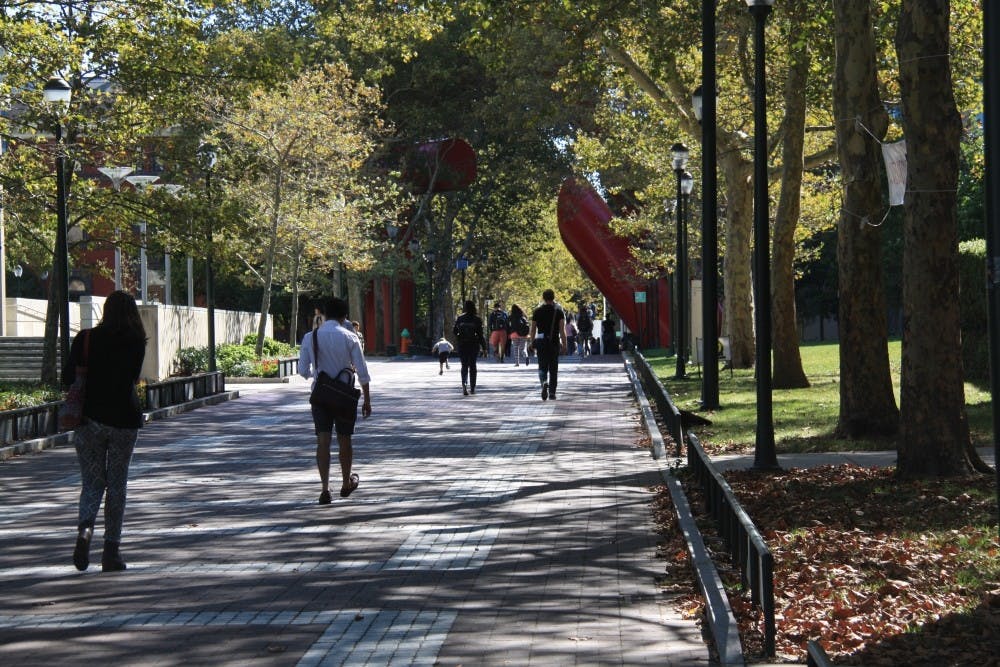
Professors who have presented for the 60-Second Lectures reflect on the challenges of presenting their studies in the short-amount of alotted time.
During the midday rush from Harnwell College House to David Rittenhouse Laboratory, it’s rare to see anyone stop to take a breath. But students who stop for just one minute at Stiteler Plaza on certain days can absorb an entire lecture.
The 60-Second Lectures, which began in the summer of 1999, has highlighted the research of professors from 22 of the 26 departments in the School of Arts and Sciences. On certain Wednesdays, a professor gives a 60-second lecture at 11:55 a.m. about his or her research.
The lecture series was originally held only during the summer, but was moved to the academic year in 2003, Dean of the College of Arts and Sciences Dennis DeTurck said.
DeTurck, who has served as the moderator of the lecture series since his appointment to dean in 2005, has given several lectures, but is also responsible for some key changes that have made the lectures more accessible to students.
The lectures were originally held at noon. But when he realized that many students are in class at that time, DeTurck decided to move the lectures to 11:55 a.m.
Recent online streaming of the lectures as well as uploads to YouTube has made these short lectures available to an even wider audience.
For professors who are asked to give these lectures, however, finding how to say what you want to say can be challenging
“When you finish writing what you want to say, you read [your mini-lecture] out loud and realize that it’s six-and-a-half minutes,” DeTurck said.
Germanic language and literatures professor Simon Richter, who spoke last Wednesday on interpretations of the word “sustainability” across cultures, said it was harder to prepare for this lecture than for a 20 or 40 minute talk. Even though the lectures are short, he had to choose the material carefully since it was then archived.
For linguistics, computer science and psychology professor Charles Yang, that task is not as simple as it seems.
“You don’t want to trivialize the subject matter, but at the same time you don’t want to go into detail,” said Yang, who spoke on Sept. 7 about how children learn to count.
Yang compared the lecture to an elevator pitch, but also explained that the balance of information in the lecture was especially intricate.
According to Yang, it is essential for lecturers to choose accessible topics to actively engage listeners, as opposed to choosing some esoteric part of research that some audience members may find unfamiliar.
On the other hand, Fels Institute of Government Executive Director Nelson Lim said the preparation for 60-second lectures is no different than the preparation required for a lecture of normal length.
“There is no need to create suspense. Everything gets boiled down to one minute,” said Lim, who gave a lecture last week regarding the importance of jobs in bureaucracy.
Besides condensing their research to such a short period of time, lecturers also need to generate interest in their research while at the same time catering to a large audience of diverse students.
“You need to get the main idea across, presumably accessibly but also in a way to generate curiosity,” Yang said.
Despite the wave of increasing digitalization and condensation of information, the lecturers believe that traditional classroom lectures will never become as short as 60 seconds.
Even though research can be summarized into short segments, Richter said, the classroom setting where people partake in extended discussions will never disappear.
Other professors also agreed that even though the medium of the 60-second lecture allows for better access to information for the public, it will never take the place of people-to-people interactions that can only develop over time.
“I don’t think that the close interactions with students in a small class setting can be replaced,” Yang said.
The Daily Pennsylvanian is an independent, student-run newspaper. Please consider making a donation to support the coverage that shapes the University. Your generosity ensures a future of strong journalism at Penn.
DonatePlease note All comments are eligible for publication in The Daily Pennsylvanian.




